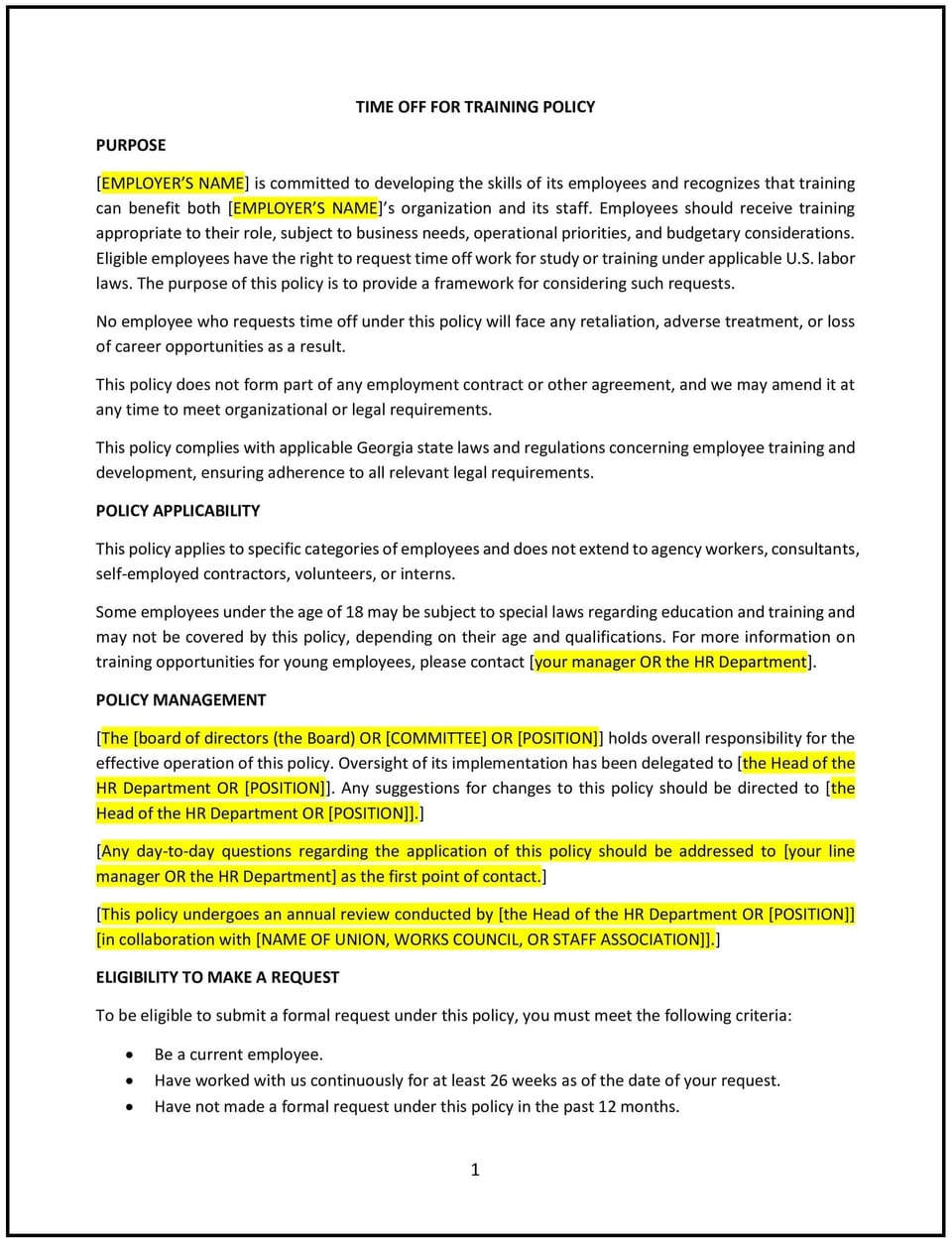Time off for training policy (Georgia): Free template

Time off for training policy (Georgia)
This time off for training policy is designed to help Georgia businesses support employees' professional development by providing time for training, skill enhancement, and career growth. The policy outlines eligibility, procedures for requesting time off, and expectations during the training period.
By implementing this policy, businesses can promote a skilled workforce, improve employee engagement, and enhance overall productivity.
How to use this time off for training policy (Georgia)
- Define eligible training: Specify the types of training programs covered under this policy, such as workshops, certification courses, or conferences.
- Establish eligibility: Identify criteria for employees to qualify for training time off, such as tenure, role, or relevance of the training to their position.
- Set application procedures: Require employees to submit requests for training time off in writing, including details of the program, dates, and objectives.
- Address funding: Clearly outline whether the business will cover training costs, partially reimburse expenses, or require employees to bear the costs.
- Maintain communication: Ensure employees provide updates on training outcomes and discuss how their new skills will benefit their role.
- Align with business needs: Balance training schedules with operational requirements to minimize disruption.
- Review and update regularly: Periodically assess the policy to reflect changes in Georgia workplace practices, industry trends, or employee feedback.
Benefits of using this time off for training policy (Georgia)
Implementing this policy provides several advantages for Georgia businesses:
- Enhances workforce skills: Encourages employees to acquire new competencies that benefit the business.
- Improves employee retention: Supporting professional growth fosters loyalty and job satisfaction.
- Boosts productivity: Training equips employees with the tools to perform their duties more effectively.
- Promotes adaptability: Ongoing learning helps businesses stay competitive in evolving markets.
- Reflects Georgia-specific practices: Tailoring the policy to local workforce needs ensures relevance and practicality.
Tips for using this time off for training policy (Georgia)
- Communicate opportunities: Share information about relevant training programs and resources with employees.
- Encourage feedback: Solicit input from employees about training needs and preferences to make the policy more effective.
- Track participation: Maintain records of employees who take training time off to assess the policy’s impact and benefits.
- Provide follow-up support: Offer opportunities for employees to apply their new skills through projects or expanded responsibilities.
- Align with goals: Ensure training aligns with organizational objectives and supports employee career development.
Q: What types of training are covered under this policy?
A: Covered training includes workshops, certification programs, industry conferences, and other professional development opportunities relevant to an employee’s role.
Q: How should employees request time off for training?
A: Employees should submit a written request to their supervisor or HR, including details about the training program, dates, and objectives.
Q: Are training costs covered by the business?
A: Businesses should specify in the policy whether they fully cover, partially reimburse, or require employees to pay for training costs.
Q: Can businesses deny a request for training time off?
A: Businesses may deny a request if it conflicts with operational needs or if the training is not relevant to the employee’s role.
Q: How can businesses minimize disruptions during training time off?
A: Businesses should plan ahead by redistributing tasks or scheduling training during less busy periods.
Q: Should employees provide feedback after completing training?
A: Yes, employees should share insights from the training and discuss how they plan to apply new skills to their role.
Q: How often should this policy be reviewed?
A: The policy should be reviewed annually or as needed to reflect changes in Georgia workplace practices or employee development priorities.
This article contains general legal information and does not contain legal advice. Cobrief is not a law firm or a substitute for an attorney or law firm. The law is complex and changes often. For legal advice, please ask a lawyer.


